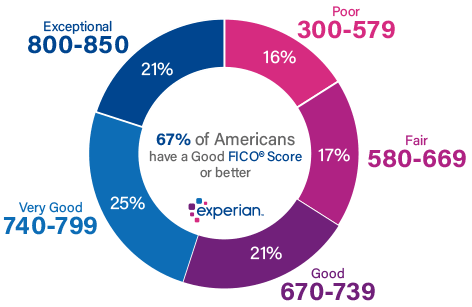Advice from CreditKarma.

- If you’re paring down your accounts, don’t close your oldest credit card — it’s what gives you a long credit history
- Sometimes credit cards will close an old account that never gets used. Use an old card now and then to prevent a potential score drop.
- When an older account (like mortgage or student loan) falls off your report, your score could drop since you’re losing the credit history that comes with that account.
Derogatory marks are good to avoid — they can stay on your report for 7-10 years.
If you have a collection
- Since debt collectors need to have proof that their info is accurate, you should dispute a collection if anything’s off.
- Know your rights — debt collectors can’t keep calling you.
- See if it’s worth negotiating your debt. If it’s old, you might just wait for it to fall off.
If you have a public record
- Public records like bankruptcies, civil judgements, and tax liens are harder to remove.
- If any info is wrong, get documentation and court records to build your case.
- Dispute with the credit bureaus to remove the public record.
What to know about Credit Cards
- Credit card use matters most for each individual card.
- The average use across all your cards is important, too.
- Try to stay under 30% (under 10% is even better!) — and remember, you don’t need to carry any credit card debt to build your credit.
How this gets calculated
- Banks usually share your info with credit bureaus on the same day each month.
- This isn’t the same day you pay your bill.
- That means you could have paid your bill to $0, but a different number gets on your credit report.
What to know about late payments
- A single 30 or 60 day missed payment is easier to recover from, but can hurt your score significantly.
- A 90 day missed payment is more damaging and could disqualify you from certain loans.
- After 90 days, missed payments can become charge-offs and be sent to a collection agency.
How this gets calculated
- This percentage follows a formula that includes all the possible payments you can make across all your reported accounts.
- For example: If you had 120 possible payments in your credit history, but had 3 late payments in that time, the calculation would be: (120 - 3) / 120 = 97.5%
Lenders typically like to see that you've used a variety of accounts responsibly.
What to know
- Having different account types (like credit cards and loans) can help your credit.
- Don’t fret about an exact number or mix, since you’ll build these over time. The important thing is that you’re using accounts responsibly.
- If a mortgage, student loan or auto loan falls off your report, your score could drop since you’re losing a line of credit that’s given you a lot of credit history.
Hard
inquiries from things like credit applications can stay on your report
for up to 2 years, but their effects tend to fade over time.
What to know
- Good news! It’s a temporary ding and scores usually bounce back in 3 months.
- Plan ahead and minimize your hard inquiries at least 9-12 months before trying to get a mortgage or big loan.
No comments:
Post a Comment